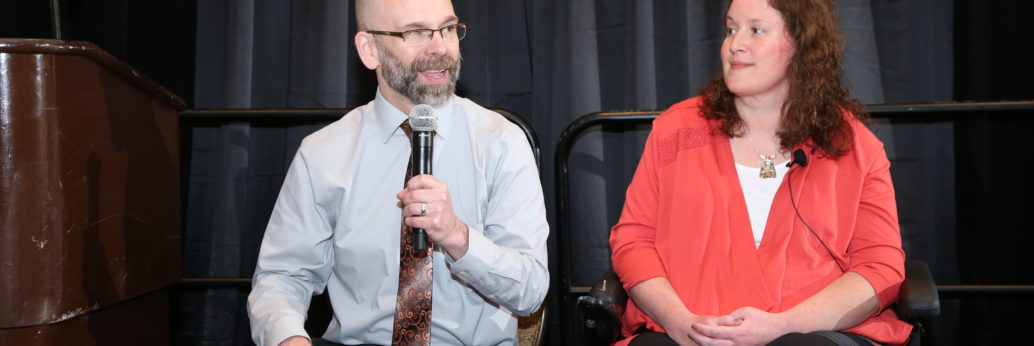As I was reading at the dining room table, I heard a car and then my husband’s voice. “Strange,” I thought. “Maybe Dan ran into someone he knew while he was out on his run.”
So I kept reading, only to be horrified when I saw Dan walk in the front door. His right eye socket, left hand and knee and white wicking running shirt all were covered in blood.
“Oh, no,” I cried. “Oh, no. Dan, what happened?”
Dan dabbed his eye with the blood-soaked blue napkin he received from the kind stranger who gave him a ride home. He was trying to calm himself and me down from the shock of it all. But all I wanted to know was whether he was OK and what happened.
Because of his MS, Dan drags his left foot when he gets tired. And when he drags his foot, occasionally he clips things like cracks in the sidewalk. I always tell Dan to pick up his feet before he goes for a run. Clearly, he must not have listened to my advice that day.
After he said he was fine and confirmed that he had clipped some uneven pavement, I declared that he was never going to run outside anymore, which indirectly was telling him it was his fault. He was lucky that he wasn’t hurt worse, and I was lucky and thankful for that too. So that’s it. No more running outside.
****
I came home from work at CMU, and Jennifer needed help transferring in the bathroom. She explained that she had been feeling pretty weak when her caregiver tried helping her earlier in the day, but I wasn’t concerned.
We’re seasoned veterans with this whole transferring thing. It’s something we do several times each day.
But after three failed attempts to help Jennifer stand up – her left leg wouldn’t lock to support her – I was quick to troubleshoot and ask her what was wrong, which indirectly was telling her it was her fault.
I began asking, “Is it too warm in here for you? Are you hungry? Tired? Maybe we need to get more sleep at night? Have you stretched recently?”
And so I went into the hallway, turned the air conditioning to a cooler temperature and declared that that night we were going to bed early so I could stretch her legs. End of story.
****
It’s interesting how, even though we both have MS and know from personal experience how unpredictable the disease can be, we both are so quick to blame and find fault in what the other person is or isn’t doing. It’s as though because we can’t take it out on the MS, we take our frustrations out on the one person closest to the disease.
Should Dan choose less rugged running routes? Of course. Should Jennifer stretch her legs more often? Absolutely.
But when it comes to dealing with such issues in a relationship, sometimes the most important step is to take a step back and assess the root of the perceived problems. Often it’s the harsh reality that we each are dealing with a progressive and unpredictable disease, both as a caregiver and a caretaker.
That’s MS. Period.
And it’s essential to remember that we need to lean on each other rather than to blame one another when facing the challenges of this disease.





This was a master class in compassion, nonjudgement, and love. Thanks for being a light on our path.
Thanks Dan and Jennifer for the much-needed reminder!
Peace,
Muff
Thank you for sharing. With both of us having it as well, it’s encouraging to read this and know we’re not alone.
Last night we were out for a push and roll to a Halloween Parade in a neighboring town when suddenly and loudly Patti exclaims “this town sucks”! Cracks, uneven pavement, etc made the sidewalk brutal for anyone in a wheelchair while technically accessible. … We’ve been at this a long time and Patti could have said, “are you nuts” to me in frustration but after two decades of push and roll you learn who NOT to blame. 🙂
Caregivingly Yours, Patrick